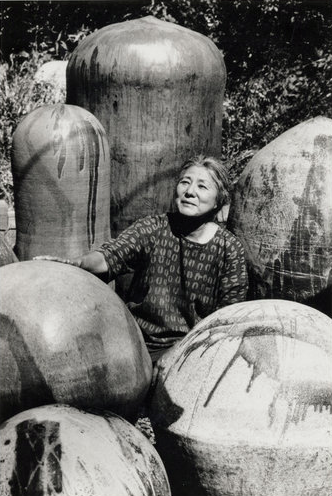 Toshiko Takaezu (1922–2011) with some of her "closed form" works.
Toshiko Takaezu (1922–2011) with some of her "closed form" works.Via nytimes.com:
Early in her career [Takaezu] made traditional vessels but in the late 1950s, strongly influenced by the Finnish ceramist Maija Grotell, she embraced the notion of ceramic pieces as artworks meant to be seen rather than used. She closed off the top of her vessels, leaving a vestigial nipple-like opening and creating, in effect, a clay canvas for glazing of all kinds: brushing, dripping, pouring and dipping.(More here.) Here's a 2010 interview with Takaezu in her home/studio:
She became known for the squat balls she called moon pots; the vertical “closed forms,” which grew sharply in height in the 1990s; and thin ceramic trunks inspired by the scorched trees she had seen along the Devastation Trail in Hawaii’s Volcanoes National Park. At times Ms. Takaezu exhibited the moon pots in hammocks, an allusion to her method of drying the pots in nets. She also cast bronze bells and wove rugs.
Strongly influenced by her study of Zen Buddhism, she regarded her ceramic work as an outgrowth of nature and seamlessly interconnected with the rest of her life. “I see no difference between making pots, cooking and growing vegetables,” she was fond of saying. Indeed, she often used her kilns to bake chicken in clay, and dry mushrooms, apples and zucchinis.
An Interview with Toshiko Takaezu from D.B.Long on Vimeo.